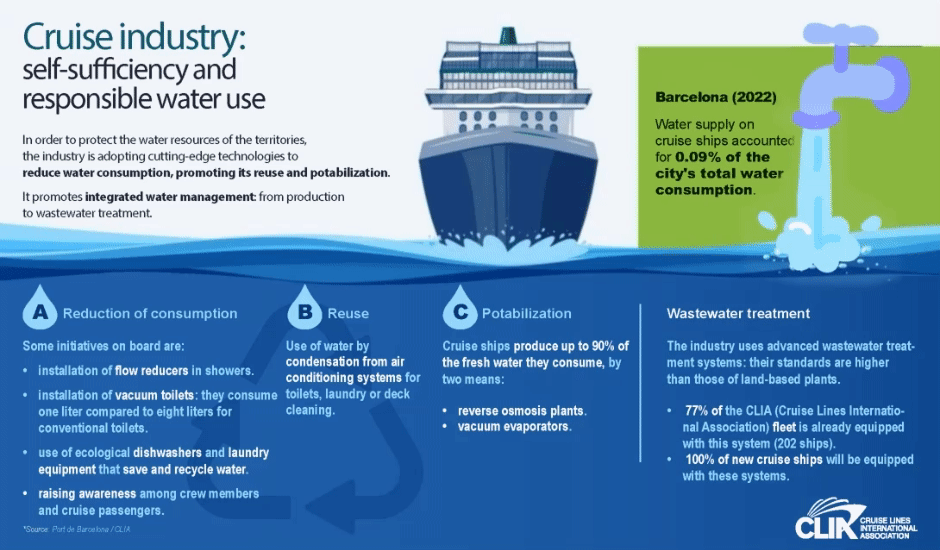Cruises and environment
What are the sectors that release the most emissions in Barcelona? How much water does a cruise ship consume? How is its waste recycled? When will we see zero-emission cruise ships?
Drought emergency
The Port has promoted the signing of an agreement so that, following the declaration of the drought emergency phase, ships will only be supplied with water in Barcelona if no other alternatives are available. The shipping companies that form part of CLIA have signed the agreement. They represent 98% of the cruise passengers that the Port receives.

How much water do cruise ships consume?
Cruise ships have long been an example of self-sufficiency and water independence thanks to advanced desalination and reuse equipment that allows them not to be dependent on the water resources of the destinations. Eighty percent of cruise ships calling at Barcelona do not take on water at the port because they do not need it. In 2022, water consumption by cruise ships was 0.09% of the total water consumed in Barcelona.

CO2 emissions in Barcelona by sector
Emissions from maritime activities are 10.9% of the total, including not only cruise ship emissions but all port activity. If we focus only on cruise ship activity, CO2 emissions are 1.3% of total emissions in the city of Barcelona and NOx emissions are 0.7%.

Suspended particles
The Port's cruise activity is responsible for 0.7% of nitrogen oxide (NOx) emissions and 0.16% of suspended particulate matter (PM10 and PM2.5) in Barcelona. The sector's contribution to air pollution is not only very modest, but also decreased by 10% compared to a 2016 study. If we only focus on cruise activity, CO2 emissions represent 3.1% of total emissions in the city of Barcelona.

Onboard waste management
Today, shipping companies have an environmental department headed by and Environmental Officer. Shis are equipped with sophisticated systems that allow the utilization of almost 100% of the waste generated on board through disposal, reuse, recycling...

Towards zero-emission cruise ships
Mobility with liquefied natural gas (LNG)
LNG is an alternative, clean and ecological fuel that reduces emissions of nitrogen oxides (NOx) by 90% and CO2 by 40% without producing sulfur compounds or particles and without polluting soil or water in case of spillage. At the Port of Barcelona we promote the use of this ecological fuel for ships, trucks and port equipment to achieve sustainable maritime transport and comply with the 2020 IMO (International Maritime Organization) standard.
Giving value to environmentally friendly boats
60% of the cruise ships calling at the Port of Barcelona have been built after 2010 and produce up to 20% less emissions, and 10% of the ships arriving in Barcelona already run on LNG. To increase these figures and achieve our goals, in addition to promoting sustainability in the industry, we offer a range of discounts on green ships when using the port grounds and its facilities.



